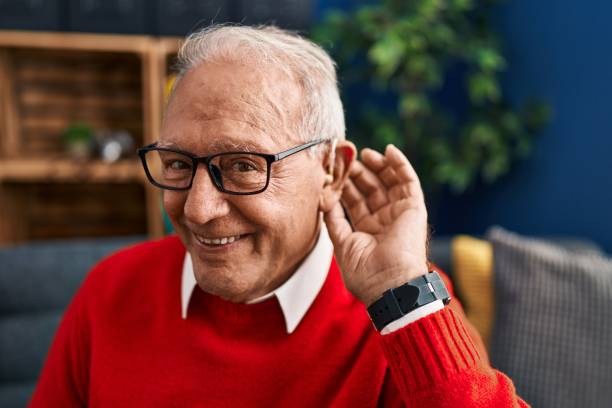Straight Talk About Senior Hearing Loss
What Is Age-Related Hearing Loss?
Most people know someone in their family or social circle that is dealing with hearing loss. Age related hearing loss (also known as Presbycusis) is prevalent in senior populations, affecting about 1 in 3 people over 65 and almost 1 in 2 people aged 75 and older. In many cases, Presbycusis goes undetected in its early stages because the loss of hearing is slow and gradual in its progression, often beginning in the 50’s and 60’s.
Identify the Symptoms of Hearing Loss
While age related hearing loss is not a serious, life-threatening disease, it can progress to a point where it impacts the quality of life of people who have the condition. Presbycusis typically affects a person’s ability to hear high pitch sounds such as birds chirping, a phone ringing or household appliances dinging.
Speech and conversations become more difficult to understand, especially when background noise is present. Left untreated, hearing loss can lead to more serious health issues such as depression, anxiety, cognitive decline, and a deterioration of personal and social relationships.
Effective Treatments for Age-Related Hearing Loss
The good news about age related hearing loss is that it is easily treatable, but a professional diagnosis by a medical practitioner or licensed audiologist is recommended. Considerations for the type of treatment chosen will typically take into consideration your age, overall health condition, medications you are taking, and personal preferences for options available.
Latest Hearing Aid Technology and Innovations
Hearing technologies are continually evolving and include inner ear devices, telephone amplifiers and speech-to-text software that enables more people to hear better and enjoy life to the fullest. Some devices utilize artificial intelligence that cancels noises and automatically adjusts hearing volumes in all types of environments.
Wireless connectivity is also now available that makes hearing aids easier to use and operate from your smartphone or smartwatch.
Helping a Loved One in Denial About Hearing Loss
Many seniors suffering from age related hearing loss are in the denial stage. Their hearing loss is so slow and gradual they fail or refuse to acknowledge it until the symptoms become so severe their ability to function normally in daily life is negatively affected. Family and friends dealing with seniors in denial are advised to take a proactive approach with strategies that include:
- Talk with them in an environment with no or minimal background noise. Turn off televisions, radios or other noise generating devices. If out in public, look for a quiet place to engage in a conversation so it is easier for them to hear what you are saying.
- Face them directly, eye-to-eye if possible. Make sure the lighting is good and minimize the distance that your speech sounds must travel.
- Use facial and hand gestures to emphasize your speech. This will provide them with clues and clarification of what you are trying to communicate.
- Speak as normally as possible, clearly, and slowly. If necessary, you can increase the volume of your speech but do not shout.
- If the person you are speaking to has trouble understanding what you said, do not repeat yourself. Instead, rephrase your words so they can easier understand.
- Have a notepad and pen handy. Communicating in writing can help avoid a troublesome or uncomfortable situation for everyone involved.
Age related hearing loss affects both ears and is not a reversible condition. If you or someone you know is dealing with hearing loss, consult an Otolaryngologist. These board-certified physicians specialize in diseases of the ears, nose and throat. You can also consult with a licensed Audiologist who can test for hearing problems and recommend follow-up treatment options and devices.
Steps To Take Now If You Suspect Hearing Loss is Occurring
If you notice a sudden or dramatic loss of hearing, consult a physician immediately. Scheduling regular hearing check-ups when you reach your senior years can help you better identify and manage age related hearing loss before it becomes a bigger problem. Being proactive about hearing loss can help you and your loved ones to live life to the fullest.


Leave a Reply
You must be logged in to post a comment.